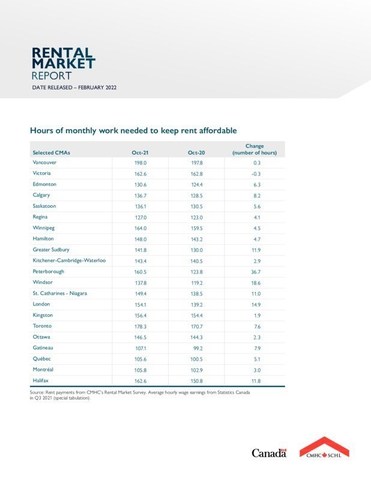OTTAWA, ON, Feb. 18, 2022 /CNW/ - After a pandemic-induced spike in 2020, the national vacancy rate for purpose-built rental apartments held steady at 3.1% in 2021 according to the latest Rental Market Report released by Canada Mortgage and Housing Corporation (CMHC).
Along with elevated levels of new rental supply coming onto the market in 2021, stability in Montreal's vacancy rate was a key factor for the steady national vacancy rate, as this market accounts for roughly 30% of the country's primary rental market. Montreal's stable vacancy rate offset increases to vacancy rates in other markets, especially the significant increase in Toronto.
Despite added supply and a stable vacancy rate, rental affordability continues to pose a significant challenge across the country.
Quote:
"Different rates of economic recovery led to an uneven pattern in rental demand in Canada. Rents grew in the Maritimes, British Columbia, and Quebec, while some other markets, such as Toronto, saw rental demand continue to be outpaced by supply,'' said Bob Dugan, CMHC's chief economist. ''Affordability continues to be a concern across the country, with few units available to renters with the lowest household incomes."
Key Findings:
- The average vacancy rate for purpose-built rental apartment units across Canadian centers with a population of 10,000 or more was 3.1% in 2021, a statistically insignificant change from 3.2% in 2020. This leaves the vacancy rate above the pre-COVID level of 2.2% in 2019, but in line with its longer-run average.
- Vacancy rates declined in 21 of the 37 markets surveyed, including Vancouver, Calgary, Victoria, and Halifax. Rates increased in 3 centers, including Toronto, while holding steady in the remaining 13 centers, including Montreal.
- The average two-bedroom rent across CMA's (Census Metropolitan Areas) increased to $1,167 in 2021. The market with the highest average monthly rent level continued to be Vancouver ($1,824) followed by Toronto ($1,679), while Montreal ($932) continued to see amongst the lowest rent levels in Canada.
- The average pace of rent growth for two-bedroom apartments in the combined CMAs slowed to 3.0% from 3.5%, closer to the historical average of 2.7%.
- Several centers were exceptions to the national trend and saw the pace of rent growth increase, including Vancouver, Victoria and Montreal. Toronto registered one of the largest declines in same sample rent growth, consistent with Toronto's vacancy rate increasing as a partial result of lingering pandemic impacts.
- Condominium rental markets continued to be particularly tight in several major centers, including Vancouver and Ottawa (both seeing a vacancy rate of 0.8% in 2021), Montreal (1.4%) and Toronto (1.7%). These tight conditions and total stock of rented condominium apartments across these CMA's surveyed indicate the importance of this rental segment to markets, especially Toronto and Vancouver.
- Rental affordability continues to pose a significant challenge across the country with most centres reporting a lack of affordable units for households in the lowest income quintiles and several markets reporting declines in such units from 2020.
Affordability in the purpose-built rental market
Affordability is generally defined as spending no more than 30% of gross income on monthly rent. For the latest Rental Market Report, CMHC is providing a new way of thinking about affordability in the various Canadian CMAs. Using a specific CMA's average monthly rent for a two-bedroom apartment and the specific CMA's average hourly wage, it allows us to determine the total number of hours an individual would have to work per month to afford the average rent for a two-bedroom apartment in their home city.
Full-time employment equals 150 hours a month (or 37.5 hours a week), meaning CMAs showing more than 150 hours implies the average rent is not affordable for a single average wage earner without another source of income, even if they work full time.
Hours of work needed per month to keep monthly rent affordable |
|||
Selected CMAs |
Oct-21 |
Oct-20 |
Change (number of hours) |
Vancouver |
198.0 |
197.8 |
0.3 |
Victoria |
162.6 |
162.8 |
-0.3 |
Edmonton |
130.6 |
124.4 |
6.3 |
Calgary |
136.7 |
128.5 |
8.2 |
Saskatoon |
136.1 |
130.5 |
5.6 |
Regina |
127.0 |
123.0 |
4.1 |
Winnipeg |
164.0 |
159.5 |
4.5 |
Hamilton |
148.0 |
143.2 |
4.7 |
Greater Sudbury |
141.8 |
130.0 |
11.9 |
KCW** |
143.4 |
140.5 |
2.9 |
Peterborough |
160.5 |
123.8 |
36.7 |
Windsor |
137.8 |
119.2 |
18.6 |
St. Catharines - Niagara |
149.4 |
138.5 |
11.0 |
London |
154.1 |
139.2 |
14.9 |
Kingston |
156.4 |
154.4 |
1.9 |
Toronto |
178.3 |
170.7 |
7.6 |
Ottawa |
146.5 |
144.3 |
2.3 |
Gatineau |
107.1 |
99.2 |
7.9 |
Québec |
105.6 |
100.5 |
5.1 |
Montréal |
105.8 |
102.9 |
3.0 |
Halifax |
162.6 |
150.8 |
11.8 |
Source: Rent payments from CMHC's Rental Market Survey. Average hourly wage earnings from Statistics Canada in Q3 2021 (special tabulation).
** Kitchener-Cambridge-Waterloo
As the above measurement uses a single wage earner making the average wage in specific CMAs, we recognize it will not reflect the situation of all households. This measurement serves as one tool to better understand issues related to rental affordability across Canadian cities. Even in cities with lower average monthly rents, households in lower income brackets may still have difficulty finding shelter that is affordable.
For information on this release:
We encourage journalists to contact CMHC Media Relations and arrange to speak to our experts regarding the rental markets and rental affordability in the 22 CMAs covered in the Rental Market Report.
Follow us on Twitter, YouTube, LinkedIn, Facebook and Instagram.
Backgrounder:
CMHC strongly believes that better, more informed housing decisions are made with the availability of quality housing market data and insights. CMHC's reporting on the rental markets has been mainstay of the sector for over 50 years. The data and analysis gathered provides a common language for businesses, governments, and the general public to discuss rental market issues and developments.
CMHC conducts the annual Rental Market Survey in October. The survey is conducted through property managers, landlords, and owners across all centres with a population of at least 10,000. It targets only privately initiated structures with at least three rental units, which have been on the market for at least three months.
SOURCE Canada Mortgage and Housing Corporation

CMHC Media Relations, [email protected]


Share this article